World Bank's and AIDIS's Panel Discussion: Challenges and Guidance for Achieving SDG 6 of Safe Water and Sanitation for All
Work area(s)
Topic(s)
ECLAC's Natural Resources Division was invited to take part in the discussion panel organized by the World Bank and AIDIS on the challenges and guidelines for meeting SDG 6. The panel brought together a group of experts and leaders from the water sector to analyze strategies and policies that aim to address gaps in the fulfillment of this important global objective.

Virginia Brandon, representative of the World Bank in Chile, opened the session together with Alexander Chechilnitzky, President of AIDIS Chile. The Chilean experience in water and sanitation coverage was highlighted as a testimony of the importance that the issue has taken and the support of the World Bank to the water sector in Chile was highlighted. They have been collaborating since 2009 to identify challenges and solutions that recognize the need for comprehensive management at the national and basin level that is resilient to climate change.
Gustavo Saltiel, Global Leader for Water Supply and Sanitation at the World Bank, introduced the institution's Global Water Security and Climate Change Adaptation Program, underscoring the importance of water in the World Bank's priorities and the need for significant investments to achieve universal access. While David Michaud, Practice Manager of the Latin America and Caribbean Region of the World Bank, delved into the vision of the Program for the region, highlighting the relevance of the water sector in the territory and the need to manage water strategically for its development.
To discuss the gaps that limit compliance with SDG 6, Silvia Saravia, Economic Affairs Officer of the Water and Energy Unit at ECLAC, highlighted the importance of collaboration between different actors to find agreed solutions in the sector, putting as an example, the results of the IV edition of the Regional Water Dialogues 2024 held between March 11th and 13th in San José, Costa Rica. José Luis Inglese, President of AIDIS Interamericana, joined the recommendation of networking and added the importance of supporting regulators and improving the capacity of professionals in this field, as well as the need to manage water demand and balance it with the available supply.
Evaluating policies to address water security challenges, especially the positive and negative aspects of the Chilean model, were other objectives of the session for which Jorge Rivas, Superintendent of Sanitary Services of Chile, contextualized the urban water sector and mentioned equity in the tariff system and the adaptation of the regulator to the challenges of climate change as challenges to be addressed. In turn, José́ Sáez, Director of Strategy and Corporate Affairs of Aguas Andinas, highlighted that the existence of an institutional framework that allows capacities to be generated has been fundamental for the high percentage of coverage achieved as well as for the transformation of its treatment facilities. in energy sources but urges continued progress in structural solutions.
The panel provided a platform to discuss and analyze the challenges and opportunities on the path to achieving SDG 6. Participants agreed on the importance of education and payment culture to promote responsible use of water and ensure availability. Finally, the World Bank invited institutions, such as the Superintendency of Health Services of Chile and the Natural Resources Division of ECLAC, to continue collaborating within the framework of the Global Program on Water Security and Adaptation to Climate Change and the opportunities that offers the Network and Observatory for Water Sustainability (ROSA) promoted by ECLAC.